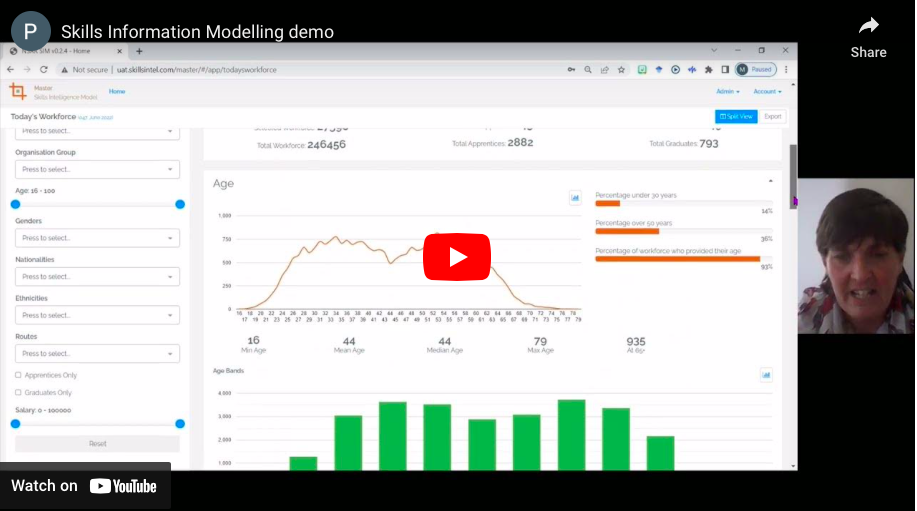Maritime UK
Future Ports Workforce
The modern port is a significantly different place to the port of history. It is increasingly shaped by forces such as globalisation of supply chains automation and digitisation. It is also shaped by external imperatives such as sustainability. We expect these trends to not only continue but to accelerate.
This changing business and organisational environment has important implications for the people working in the sector – both today and tomorrow. Whilst there are important advantages in the future port workplace, such as safety and greater opportunities to deploy new sources of talent, and whilst some (perhaps many) future roles are currently unknown, there are undoubtedly substantial challenges to be addressed. This is not only in terms of staffing the future state, but also crucially in making the transition in a timely, efficient but also responsible manner.
Achieving a better understanding of these dimensions, and the ways to address them is not a unique challenge to any one individual port operator (although the specifics of implementation inevitably will be).
Background
The major port operators undertook a piece of research to explore the three interlinked key dimensions of change, the relationships between them and how potential solutions for how they might be addressed. The overall ‘exam question’ was ‘what do the likely future ports workforce and ways of working look like and how can the sector transition from the position today’.
The project commenced in late 2020 and the University of Strathclyde Business School were selected to undertake the desk research. Interviews occurred during 2021 and a small working Group made up Commissioners and HR Directors from the major ports group was formed.
Current situation
On Monday 28 March the report was launched at a dissemination webinar to share the report recommendations including:
- Clarify which body is leading on port skills
- More joint working within the ports and maritime sector to drive improvements in diversity
- Undertake a systematic review of how skills are used now, and anticipated changes in skills/job requirements in the future
- ‘Eating the elephant’ a mouthful at a time – focused best practice sharing and ‘sprints’
- Investigate priority near-term skills gaps/shortages, including learning lessons from other sectors
- Develop more proactive approaches to upskilling, reskilling, and retraining the current workforce
- Working together to inform a better skills policy and funding landscape
- Developing the HR capability across the sector.
The full report can be found via the link below.
In December 2022, it was endorsed that Port Skills and Safety would partner with the MSC and National Skills for Rail (NSAR) to commence a Skills Intelligence Model (SIM). Further information can be read here.
We will continue to update this page with progress on the SIM.
Port Workforce Survey
The Maritime Skills Commission has partnered with Port Skills and Safety (PSS) to gather data on the current UK ports workforce and identify skills gaps affecting the current workforce and the potential future skills needs.
PSS is renewing its commitment to skills and in January will be launching a new five-year skills strategy to ensure that members, and the wider UK ports sector, share best practice, support port people and identify future skills needs. As part of this plan, PSS and the MSC have commissioned the National Skills Academy for Rail (NSAR) to undertake the same Skills Intelligence Modelling (SIM) process that is widely used in the rail sector to forecast future skills needs.
‘In developing our new skills strategy, it became apparent that there is a lack of data on the current workforce which restricts ports’ ability to plan and recruit for current and future needs,’ said Debbie Cavaldoro, Chief Executive at PSS. ‘Therefore, we are delighted to be partnering with MSC and NSAR to gather data on the current UK ports workforce which we can use to model the skills need.’
SIM is an innovative Skills Forecasting Tool which NSAR have developed over several years after it was first commissioned by the UK Government to forecast the future workforce skills requirements for the UK rail sector. The analytical power of the SIM has been embraced both by other sectors and internationally for strategic workforce planning, identifying skills shortages, and forecasting the impact of planned investment projects on the future workforce.
Throughout December and early January, PSS and the MSC will be asking the UK Port Sector for their help in providing workplace data. This data will be collated by National Skills Academy for Rail (NSAR) on behalf of PSS and in accordance with General Data Protection Requirements (GDPR).
A video demonstrating the SIM can be viewed here.
The Workforce Data Collection document can be downloaded here and submitted following the notes in the guidance tab.
Report and Webinar
On Monday 28 March the Maritime Skills Commission released the Future Ports Workforce Research Report.
View the report here
